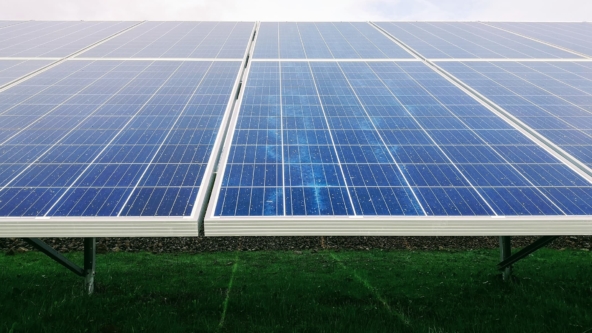Alex Brierley and Greg Jackson know how to keep the lights on in a gloomy British winter, with no wind or sun for weeks – and no backup fossil-fuel plants.
Alex Brierley, co-head of Octopus Renewables, thinks energy markets are definitely having a rainy day right now. COP26 fossil fuel commitments were underwhelming, and energy costs are spiking.
“Frankly, Europeans have very little control of their energy prices. If Mr Putin decides to squeeze our gas supplies, then prices rise over 1,000% and our industries start to shut down,” he says. “People are facing decisions about heating their homes or eating.”
Renewables and technology can remove the geopolitics and fear and re-establish a link between physical costs and location.
Goodbye, subsidies – hello, merchant risk
If we are to cap global temperature increases to even 2℃, coal use must end by 2050, and oil and gas use must decrease by 60% and 40%, respectively. The countries producing most of these commodities face a $44 trillion loss in revenue if demand plummets, with legacy assets rendered worthless.
As we wave good riddance to carbon, global electricity demand could easily double by 2050. Wind and solar will have to take an even bigger share of the energy mix. If we add in battery storage technology, hydrogen and local, collectively owned generation, that is a €1.7 trillion investment opportunity in Europe alone.
But before investors rush to build another new wind farm, they must recognise the changing dynamics. Wind and solar are now so cheap to produce that governments can, and should, reduce or eliminate subsidies, thinks Brierley. When that happens, investors are open to merchant risk: can producers actually sell their energy at the right time, place and price to make a profit?
“Investors really need to understand this as they make their investments or work with a manager who understands it,” he says.
Not so dumb
Talking of understanding, traditional energy systems are rather ‘dumb’, thinks Greg Jackson, founder and CEO of Octopus Energy. Power stations idle inefficiently just in case, and customers are too passive to change their habits to grab energy at its cheapest price – or so traditional utility firms think.
“The sector had many features more in common with the financial services world: large regulated entities that had lost touch with customers, and had become bloated and inefficient,” says Greg.
In his opinion, energy companies need to stop employing more customer service staff to sort problems and focus on eliminating sources of friction in the first place. They need Octopus Energy’s Kraken technology.
With millions of smart meters installed in the UK, including for E.ON, Npower and soon EDF customers, Kraken makes accurate energy-demand forecasts every night for every connected home and business. Consumers know when it will be cheaper to top up their electric vehicles (EVs), and producers know where and when demand is greatest.
With 22 million meters added in the last 18 months through international licensing deals, Kraken can even predict demand in half-hour chunks over the next two years.
“It turns the whole energy chain on its head. The whole system transformation is beginning to look very real to us,” says Jackson.
Keep the customer happy
Clear price signals can nudge customers to make other changes, like installing efficient heat pumps. Cutting their monthly bills does wonders for a company’s image and the planet too.
“If you can build a loved brand and one that is trusted, we have the opportunity to make the biggest difference in the fight against climate change,” adds Jackson.
The formula certainly works for his customers: Octopus Energy’s brand score is twice that of its nearest-liked competitor. And it’s not just customers who are content either, as Kraken is so efficient that Octopus Energy’s operating cost is 75% lower than incumbents’ were when it launched.
For asset owners like Brierley at Octopus Renewables, those lower costs are a tangible bottom-line benefit. He says that Kraken’s demand and generation forecasting “will chop 2% off our route to market costs as assets. On a big portfolio of assets, that’s a big, visible, material gain.”
Lower costs and better returns help create a virtuous circle. When the sun shines on investors, they are more likely to commit to other renewables projects.
Insights

Reasons For Optimism

Fuelling the transition: how investors can accelerate the shift to sustainable energy

The great transition: Opening the renewables floodgate

